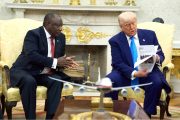As Islamists solidify their control over Egypt in the aftermath of the “Arab Spring” of 2011, the chief law enforcement officer in Dubai is warning that the new rulers of Egypt plan to export their revolution to his country —and beyond. As reported earlier this month for The New American, two radical Islamist political parties — the Muslim Brotherhood (emblem at left) and the Salafist Al-Nour party — have recently taken control of the Egyptian parliament following elections in that country:
The Islamist Muslim Brotherhood’s Freedom and Justice Party took 58 percent of the available seats in the upper house of Egypt’s parliament, while the even more extremist Salafist Al-Nour party took a quarter of the seats. In all, more than 80 percent of the contended seats in Egypt’s upper parliament are now in the hands of Muslim extremists. Last year’s “Arab Spring” is now more fully manifesting its true character: the transformation of Egypt into a more stridently Islamist regime.
While the Obama administration purportedly hoped that liberalization would follow in Egypt’s transition into a post-Mubarak future, Secretary of State Hillary Clinton signaled last fall that the U.S. government anticipated an Islamist future for Egypt. In fact, Clinton’s State Department actively solicited Congress for a special fund to help spread the ‘reforms’ allegedly initiated by the “Arab Spring” in Egypt. As reported in February of this year, a “special $700 million fund” was proposed as part of the State Department’s projected $51.6 billion budget for fiscal year 2013. The State Department planned to use the funds to target a total of 11 nations. As CNS News reported:
They include countries where transitions are underway after violent upheavals — even though uncertainties and concerns about future directions persist (Egypt, Tunisia, Libya and Yemen); countries and territories where reforms have been proposed and to various degrees implemented but existing regimes remain in place (Jordan, Morocco, Bahrain, Lebanon and the Palestinian self-ruled territories); a country embroiled in a civil war (Syria) and one whose government has shown no sign of meeting citizens’ demands for change (Iran).
As extensive as the list of targeted is, Dubai was not on the State Department’s ‘short list’ for its own “Arab Spring.” However, the several news outlets are reporting that Dubai has learned from U.S. intelligence sources that Egypt’s Muslim Brotherhood has plans of its own for the United Arab Emirates and other Arab monarchies. The Kuwait Times reports that Egypt has a revolutionary agenda for the monarchies of the region:
The Muslim Brotherhood, the main Islamist force that emerged after the Arab Spring, is plotting to take over Gulf states, Dubai’s police chief said in remarks reported yesterday. Lieutenant General Dahi Khalfan said he had his reasons to claim that the “Brotherhood was plotting to change the regimes in the Gulf”, in an interview published in the Kuwaiti daily Al-Qabas. “My sources say the next step is to make Gulf governments (their ruling families) figurehead bodies only without actual ruling. The start will be in Kuwait in 2013 and in other Gulf states in 2016,” he said.
Khalfan has been involved in a tit-for-tat controversy with the Brotherhood after he threatened earlier this month to arrest cleric Yusuf Al-Qaradawi, a leading Brotherhood figure, for criticising the United Arab Emirates for deporting Syrian protesters. The police chief said he based his information on “leaks” from Western intelligence agencies and said this “had been known to us”. “If these leaks from Western intelligence were to be correct, by 2016 all Gulf rulers” will be just figureheads with no actual power, Khalfan said. “I am warning Gulf states about these groups.”
A similar article published by Albawaba News also relayed Khalfan’s comments, with the observation that the process is apparently already underway in Kuwait: “Note that the Islamists won the parliamentary elections held February 2nd in Kuwait, capturing 23 of 50 parliamentary seats.”
An article for the Financial Times (“Dubai police chief slams Brotherhood”) observed that while Kuwait has a history of tolerating the Muslim Brotherhood, the UAE has been engaged in a crackdown on radical Islamists who were active in the Islah society:
In December seven members of the Islamist Islah society — a group which claims to have 20,000 followers and first flourished in the 1970s — had their nationality revoked on unspecified security grounds.
Islah was tolerated, and at times supported, through the UAE’s 40-year history, allowing Islamists to gain a foothold in education and the judiciary. But since the September 11 attacks the government has taken an uncompromising stance towards any manifestation of political Islam.
Last year, the authorities dissolved the elected boards of Islah, as well as the teachers’ and jurists’ associations, replacing them with state appointees.
Only time will tell whether or not the Muslim Brotherhood is actively engaged in a strategy to subvert various governments throughout the Arab world. Critics observe that the United States has very little interest in the fate of various Arab monarchies — or ‘democracies,’ for that matter. However, the concentration of oil in the region makes the destabilization of various nations — both ‘homegrown’ and that which has been fed by the United States and other Western nations — problematic to the global economy at a time when gasoline is over four dollars a gallon in much of the United States.




